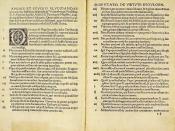Beginning in the mid-1520s and continuing throughout the sixteenth century was an idea labeled 'confessionalization.' Confessionalization was, in essence, a solidifying and institutionalizing of denominational beliefs. There were a number of reasons why this confessionalization occurred. A ridiculous amount of political turmoil was happening in Germany. The Holy Roman Empire was divided, and as the teachings of Martin Luther and John Calvin settled into governmental systems, so did the systems change to accommodate these newly accepted theologies. The common layperson became somewhat more involved in the clerical doings with the political adoptions of Lutheranism and Catholicism. There was a plethora or consequences of confessionalization - a more permanent rift in the church, several wars, increased government tumult, and religious and political refugees en masse.
Confessionalization had clear-cut formulas among adherents. Whether they are Catholic, Lutheran, or Calvinist, everyone was required to have a confession of faith - the same confession as the ruler.
Those believing otherwise were expelled or treated unfairly. There were no atheists. Examinations and visitations were regular occurrences. Not only this, but censorship of other confessions was also constant. Education specific to the confession was required.
Confessionalization, as Reinhard's article states, occurred because religious groups "had no other choice but to establish themselves as 'churches,' i.e. stable organizations with well defined membership", and that "particular confessions of faith served to distinguish those separate religious communities from each other" (p. 390). But why did religious groups have no other choice but to establish themselves in government? A series of reforms may have led up to the joining of individual churches and states. Protestants were more open to preaching their values. Regional religious uniformity was promoted, stable clergy were encouraged, propaganda campaigns censored conflicting views and disseminated "proper" practice, better religious education was instituted, and a language unique to...


